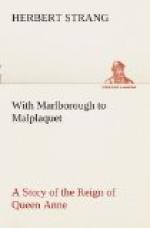“We’ll show them a bit of fight all the same,” George put in eagerly. The old salt shook his head again.
Quickly the big vessel overhauled the collier brig, and signals were made to pull down her flag, whereupon the Englishman grunted.
Within a minute a puff was seen, and a round shot whizzed close past the Ouseburn Lassie’s bows.
“Give them a reply!” George urged in great excitement.
“Wait a bit, my lad,” and the skipper bided his time.
“Now!” came the order at length, and a couple of eight-pound balls flew straight to the Frenchman.
“Well hit!” shouted the Englishmen, as a shower of splinters was seen to fly upwards from the enemy’s deck.
“It’s enough to show ’em we’ve got mettle in us,” growled the old captain, “and that’s all we can say.”
His words were justified, for the next moment there came another flash, and with a crash the brig’s mast went by the board.
“Done for!” groaned the skipper. “We shall see the inside of a French prison, I reckon.”
The enemy’s long boat put out with a crew four times that of the brig. Within a quarter of an hour the Englishmen had all been transferred to the Louis Treize, and an officer and half a dozen men left in charge of the prize. The Frenchman at once set a course for Dunkirk, and, with a spanking breeze behind her, she made the port in fifteen hours. The noon of the next day saw George Fairburn and his companions clapped into a French prison.
“A bonny come off,” the old skipper grumbled, “but we shall ha’ to make the best on it.”
It will not be forgotten that the war just begun was, to put it bluntly, a war to determine which of two indifferent princes, Philip of France and Charles of Austria, should have the Spanish crown. Lord Peterborough declared that it was not worth his country’s while to fight for such “a pair of louts.”
[Illustration: “Now!” came the order.]
Into the war, however, England had thrown herself, under the direction of Harley, the famous Tory minister now in power, at home, and with Marlborough as commander-in-chief of both the English and the Dutch forces abroad. The General’s first aim was to take back from Louis XIV all those fortresses in the Spanish Netherlands which had been seized and garrisoned by the French troops as if the country were a French possession.
He started from Kaiserwoerth, a town on the Rhine, which his troops had captured from one of Louis’s chief allies, the Elector of Cologne, before Marlborough arrived to take command. Venloo was taken in gallant style, and then the important city of Liege, on the Meuse. The result of the campaign was that the French had been chased from the Lower Rhine, and Holland, much to its relief, made far more safe from attack. Returning to England, the victorious commander was given a grand reception. And no wonder, for it was the first time for many a year that the French had received a real check.




